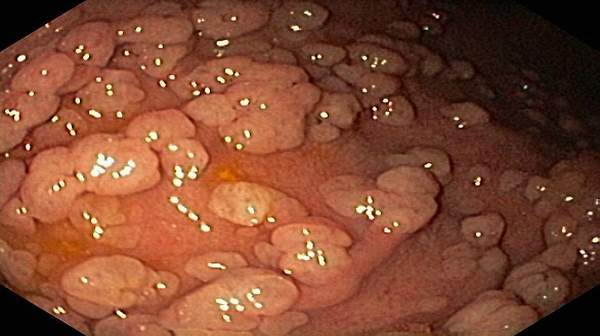What's in this article?
Familial adenomatous polyposis (FAP) is the most common adenomatous polyposis syndrome. It is an autosomal dominant inherited disorder characterized by the early onset of hundreds to thousands of adenomatous polyps throughout the colon.
How common is familial adenomatous polyposis?
The reported incidence of familial adenomatous polyposis varies from 1 in 7,000 to 1 in 22,000 individuals.
How do people inherit familial adenomatous polyposis?
Familial adenomatous polyposis can have different inheritance patterns.
When familial adenomatous polyposis results from mutations in the APC gene, it is inherited in an autosomal dominant pattern, which means one copy of the altered gene in each cell is sufficient to cause the disorder. In most cases, an affected person has one parent with the condition.
When familial adenomatous polyposis results from mutations in the MUTYH gene, it is inherited in an autosomal recessive pattern, which means both copies of the gene in each cell have mutations. Most often, the parents of an individual with an autosomal recessive condition each carry one copy of the mutated gene, but do not show signs and symptoms of the condition.
What causes classic FAP?
FAP is passed from generation to generation in a family. The APC gene is linked to FAP; APC stands for adenomatous polyposis coli. A mutation (alteration) in the APC gene gives a person an increased lifetime risk of developing colorectal cancer or other cancers of the digestive tract.
Familial adenomatous polyposis can cause other complications:
- Duodenal polyps. These polyps grow in the upper part of your small intestine and may become cancerous. But with careful monitoring, duodenal polyps can often be detected and removed before cancer develops.
- Periampullary polyps. These polyps occur where the bile and pancreas ducts enter the duodenum (ampulla). Periampullary polyps might become cancerous but can often be detected and removed before cancer develops.
- Desmoids. These noncancerous masses can arise anywhere in the body but often develop in the stomach area (abdomen). Desmoids can cause serious problems if they grow into nerves or blood vessels or exert pressure on other organs in your body.
- Other cancers. Rarely, FAP can cause cancer to develop in your thyroid gland, central nervous system, adrenal glands, liver or other organs.
- Noncancerous skin tumors.
- Noncancerous bone tumors.
- Pigment changes in the retina of your eye.
- Dental abnormalities.
Does FAP have symptoms?
In its early stages, FAP has no symptoms. That is why genetic testing or endoscopic screening starting at puberty when polyps first appear is so important. The diagnosis can and should be made before symptoms and colorectal cancer occur.
If untreated, polyps will increase in number and size. Patients may have hundreds of polyps in their colon without symptoms. As the condition progresses, patients may experience blood in the stool, diarrhea, mucous discharge, crampy abdominal pain, anemia, weight loss and intestinal obstruction. However, these symptoms may not occur until the condition has become cancerous.
What other names do people use for familial adenomatous polyposis?
- Adenomatous Polyposis Coli
- Adenomatous Polyposis of the Colon
- Colon Cancer, Familial
- Familial Intestinal Polyposis
- Familial Multiple Polyposis
- Familial Multiple Polyposis Syndrome
- Familial Polyposis Coli
- Familial Polyposis Syndrome
- FAP
- Hereditary Polyposis Coli
- MYH-associated Polyposis
- Polyposis Coli





